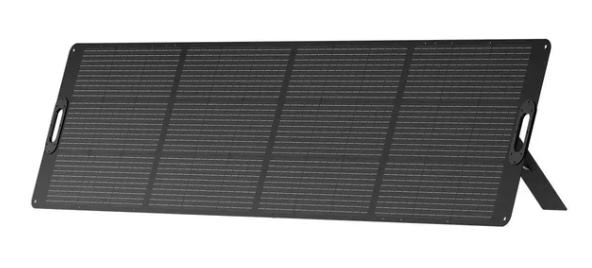
Overview
Solar panels are designed to convert sunlight into electricity every day, but many homeowners are surprised to learn that most solar systems will not provide usable power during a power outage. Whether your solar array continues working depends on the type of system you have—grid-tied, hybrid, or off-grid. Understanding these differences is essential for home backup planning, RV applications, off-grid cabins, and emergency preparedness.
This article explains why solar panels behave differently during outages, shows which systems continue to generate usable power, and discusses how portable power stations and solar generators—such as those produced by brands like OUPES—can keep essential devices running when the grid goes down.
How Solar Panels Work
1. Photovoltaic Energy Conversion
Solar panels produce direct current (DC) electricity when photons strike the semiconductor cells. This process is well-documented in research by the U.S. Department of Energy (DOE), which notes that modern monocrystalline panels convert roughly 18–23% of sunlight into electricity.
2. Role of the Inverter
Most household appliances run on alternating current (AC). Therefore, an inverter is required to convert DC from the panels into AC for home use or grid export. In a typical rooftop installation, the inverter is the critical component that determines whether a solar system operates during outages.
3. Connection to the Electrical Grid
Grid-tied solar systems are synchronized with the utility grid. They export excess electricity and draw additional power from the grid when needed. This connection provides efficiency benefits but introduces limitations during outages.
Grid-Tied vs. Off-Grid Solar Systems
1. Grid-Tied Systems
These systems account for the majority of residential installations. They are economical and take advantage of net metering programs, but they rely on the grid for stable voltage and frequency regulation.
2. Off-Grid Systems
Off-grid systems operate independently from the utility grid and require energy storage—typically lithium-iron phosphate (LiFePO4) batteries—and charge controllers. They continue working during outages because they do not depend on the grid for synchronization.
3. Hybrid Systems
A hybrid solar system combines the benefits of both approaches: it operates normally when the grid is available but can also run independently using battery storage during a blackout. This configuration is often chosen for modern home resiliency.
Why Grid-Tied Solar Systems Shut Down During Outages
Grid-tied solar inverters include a safety feature called anti-islanding. According to IEEE Standard 1547, all distributed energy resources must automatically shut down when the grid is offline. This is necessary to protect line workers, prevent backfeeding, and avoid voltage instability.
Safety Reasons for Automatic Shutdown
- Protection of utility workers: Prevents accidental energizing of power lines.
- Prevention of electrical fires: Avoids uncontrolled voltage fluctuations.
- Regulatory compliance: Required by national and international safety standards.
Therefore, if you have a standard rooftop grid-tied system, your solar panels will not provide power during a blackout unless combined with a battery or transfer switch system.
How to Keep Power During a Power Outage
1. Install a Hybrid System with Battery Storage
A hybrid inverter paired with a battery bank enables solar panels to continue operating even when the grid is offline. The battery stabilizes voltage and frequency, allowing the system to form its own microgrid.
2. Use an Off-Grid Solar System
Off-grid setups are inherently outage-proof because they never rely on the utility grid. These are common in remote cabins, tiny homes, and RVs.
3. Use Portable Solar Generators
Portable power stations with solar input—such as those made by OUPES—offer a flexible solution for backup power, camping, and off-grid living. They are simple to set up, require no installation, and provide reliable energy during emergencies.
Portable Power Stations & Solar Generators
1. What They Are
A portable solar generator combines a lithium battery, charge controller, inverter, and solar panel compatibility into a single unit. Unlike gasoline generators, they operate silently, produce no emissions, and can charge using sunlight.
2. Key Advantages During Outages
- No fuel required
- Safe for indoor use
- Supports essential appliances like refrigerators, Wi-Fi routers, CPAP machines, and communication devices
- Rechargeable via solar panels during extended outages
3. Use Cases
Portable power stations are widely used for emergency backup, RV travel, outdoor activities, and off-grid homes. They function independently of the utility grid, making them reliable during long-duration outages caused by storms, hurricanes, or wildfires.
System Comparison Table
| System Type | Works During Power Outage? | Requires Battery? | Typical Use Case |
|---|---|---|---|
| Grid-Tied Solar System | No | No | Maximizing energy savings |
| Hybrid Solar System | Yes | Yes | Home backup and energy resilience |
| Off-Grid Solar System | Yes | Yes | Remote locations, cabins, homesteads |
| Portable Solar Generator | Yes | Integrated | Emergency backup, RVs, outdoor travel |
FAQ
1. Why don't my rooftop solar panels work during a blackout?
Because grid-tied inverters must shut down for safety due to anti-islanding protections. Without a hybrid system or battery, the panels cannot operate independently.
2. Can solar panels directly power my home during an outage?
Only if you have off-grid or hybrid equipment capable of forming a microgrid. Standard on-grid systems cannot do this.
3. Can portable power stations be used with rooftop panels?
Yes, if voltage and connectors are compatible. Many portable stations accept MC4 solar inputs and can operate independently from home wiring.
4. Are portable solar generators enough for long outages?
They can power essential loads for extended periods, especially when paired with solar panels. Larger-capacity units—such as those produced by OUPES—are suitable for refrigerators, medical devices, tools, and communication equipment.
5. Should every homeowner pair solar with storage?
Increasingly, yes. With rising grid instability and extreme weather, adding battery storage greatly enhances home resilience and ensures that solar power remains usable during outages.




























